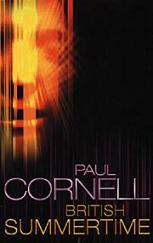
British Summertime
Paul Cornell
404 pages
published in 2002
British Summertime was a novel I didn't have high expectations of, but which pleasantly surprised me. It was one of the first books I picked up on my latest library run, as something that looked good enough to take home if I didn't find anything else. Although I did find several other, more promising novels that day (including Ink and Swiftly, I still took it home with me, read a couple of pages and banished it to the bottom of the stack. It was only when I'd finished all the other novels I'd picked up that I started on this and to my amazement found myself utterly captivated. I was all the more surprised because it quickly turned out that this was a deeply Christian novel, while I am anything but.
Usually, religion is politely ignored in science fiction, apart from the occasional made-up pagan rites to spice up some space opera or other. And when it does appear, it's usually because the author has an axe to grind. It's rare to find genuinely Christian characters in science fiction without them being stereotypes, but British Summertime has them, as well as a plot revolving around the literal truth of Christianity and manages to do so without me throwing the book against the wall. Not a mean feat, that. It works because Cornell treats it as just another interesting science fiction idea to play with.
Paul Cornell himself is a name I mostly know from his television work, particularly on Doctor Who. I hadn't read anything of him yet, apart from one issue of his Captain Britain and MI: 13 comics series. What comes across in British Summertime is his sense of place and time. Most of the action takes place in and around Bath in 2000 (with the fuel protests that happened that September being a plot point) and it's clear Cornell knows the city. It gives the story a nice grounding in reality, a benchmark for the two visions of a future Bath Cornell also provides.
Her whole life Alison Parmeter has had "chipshopness", the ability to read people and places, to see patterns in everything and know the meaning of those patterns. Usually, she tries to keep her reading confined to locating the nearest chipshop, but lately she's more and more convinced the end of the world is coming, as she sees it reflected in every pattern she reads -- in newspapers, conversations, everything. Maybe that's why she's dreaming about Judas Iscariot again....
Meanwhile, her best friend Fran has been spelunking in Poole's Cavern, working as a tour guide during the week and helping opening up the seventh cave in the complex. Unfortunately, something bad was waiting when she broke through, something golden and angelic. When Fran returns to Bath, Alison immediately knows she isn't Fran anymore, but is possessed by something. Worse, Fran's takeover seems to tie together with Alison's increasing conviction the world will come to an end.
Enter Leyton, Pilot of the Future, who crashlands in a field near modern day Bath when his space fighter is swallowed by a timewarp while making orbit in 2129, unfortunately losing his navigator, Jocelyn in the process. Jocelyn being a disembodied head builtin to the spaceship, it was kind of hard for her to escape the fire after the crash, though it later turns out she did. Leyton, who comes from a future communist utopia where money is unknown, thinks he has landed in some poverty stricken warlord ruled hellhole, especially once he hitches a ride to Bath from a Countryside Alliance supporter. Leyton runs into Alison at a chipshop, where she immediately sees he's from the future, takes him back to her flat and they tell each other their life stories. At first Alison is relieved at Leyton's description of the future, as it means her sense of the world ending must be wrong. But then it turns out Leyton has never heard of angels, or the Book of Revelations, so something has gone horrible wrong. But what role do the Golden Men that have taken over Fran and want to take over Alison have to do with this?
British Summertime is a novel with an ideological undertone to it, that ideology being Christian socialism, which is made explicit in the character of the reverend Brian Whatmore, who had spent time in Chile and Mexico and had studied liberation theology and through which Alision and Leyton get on the subject of angels and religion. In Leyton's future, the early church wasn't corrupted by the socalled Golden Men, who had travelled back from their future, where they had evolved from incredibly complex currency exchange software that had become aware, something like the "vile offspring" of Charlie Stross' Accelerando. In the timeline of that future, the fuel tax riots of 2000 mean that future British (and other) governments would be too scared to do anything drastic about global warming that would interfere with "the rights of the individual", so ultimately Britain would disappear largely under water, while Earth as a whole slowly dies, and the rich have abandonded her for a new home, Mars. Contrasted to this is Leyton's future, as said a communist utopia not that far removed from Iain Banks' Culture, but with a slightly more stiff upper lip fifties feel to it.
There's always a risk with novels like this, with a strong ideological undercurrent, that they become too overtly didactic and lose sight of the other qualities a novel should have. With British Summertime however, Paul Cornell has written a book that combines the didactic with a good story, engaging characters and some neat science fiction ideas, and managed to keep it accesible to non-science fiction readers as well. Recommended.
Read more about:
Paul Cornell,
British Summertime,
science fiction,
book review